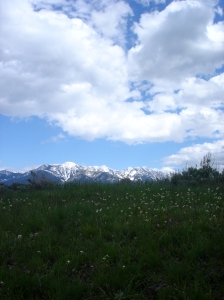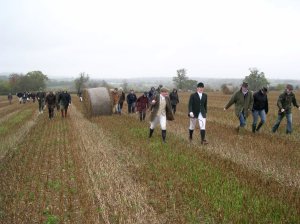Appetite for Beauty
February 28, 2009
 At church camp we watched a series of Igniter videos. One showed a montage of clips and single images, scenes from the earth, vistas and panaromas, plains and mountains and oceans. Flocks of birds lifting into flight, the vast beauties of the earth. What impressed me was the variety. The earth holds many kinds of beauty.
At church camp we watched a series of Igniter videos. One showed a montage of clips and single images, scenes from the earth, vistas and panaromas, plains and mountains and oceans. Flocks of birds lifting into flight, the vast beauties of the earth. What impressed me was the variety. The earth holds many kinds of beauty.
Beauty is the question. Why do we never tire of drinking in beauty? Why are the stars endlessly fascinating? Why does watching the rollers become breakers and spread onto the beach in foam-fringed sheets never lose its appeal? Why does tree after tree, and mountain after mountain fascinate us? Why do we never tire of beauty?
I think because there is a natural order of things. Perhaps not the Great Chain of Being, but I think we lose happiness when we strive to make gods of ourselves. We seize too much, we take too much into our dominion. We subjugate one another and rape the earth. In our fallenness, no wonder the earth groans as with birthing pains. When we, the pinnacle of creation, fall into rebellion, we send the rest of the cosmos out of whack.
The world is off-kilter, groaning for restoration and healing. We need vast expanses of beauty to remind us that our control reaches only so far. Out there over the deep oceans and high, snow-capped mountains, we feel our smallness, our transience, and we are humbled. Humility was meant to be a part of the natural order. Unfortunately, the phrase “knowing one’s place” has taken on negative connotations, referring more to a social hierarchy than an preordained organization of creatures and forces.

When we disrespect our parents, we upset the natural order. We are to respect our elders, to treat them with deference and to protect their dignity. When I take the life of another human being, I upset the natural order.
God does not hand out death warrants anymore, at least none that I can fathom. When we claim that God sanctions our wars, our capital punishment, our law enforcement, our abortions, our euthanasia, and our self defense, we take death into our own hands. We take it upon ourselves the responsibility of doling our life or death, of judging one life worth more than another. We place different values on different lives. The unborn child deserves to live; the serial killer-rapist deserves to die.
Of course, no one take responsibility for the death. The executioner is simply doing his job. The legislators are simply transmitting the wishes of the people. The judges are simply honoring the spirit of the law. Blame is dispersed. Leo Tolstoy explores this phenomenon in depth in The Kingdom of God Is Within Us. How is it that men do things while in the military, commit all sorts of atrocities for their governments and countries, to protect their “freedoms,” things which they would never do in their private lives? What forces are in place that draw these men into a certain trajectory of violence and unquestioning, uncritical subservience?
 So the question of beauty persists. We can never drink our fill. Mountains and oceans and stars and even campfires always fascinate us. We stare at them for hours and days. Because we sense on some basic human level that they help to explain our salvation. Salvation comes from outside of ourselves. The same way we cannot master the hurricanes or forest fires and neither could we resist the fires of those stars in the heavens. We cannot also master the tempests that rage in us. Lust and greed and arrogance and pride and vanity and selfishness. We do not have the resources in ourselves to pluck out these weeds. And even if we could pluck one or two, they proliferate so quickly like dandelions that in even moving the one to the compost heap or incinerator to be burned, we merely disperse its seeds across the lawn. If I think that by forces of my will and self-control that I can cure myself of lust. By averting my eyes or by downloading a program to send a list of all the sites I’ve visited to my friends or by putting some sort of filter on the internet or tv and throwing away the password. I can do all this and put a bandaid, but I have not touched the hemorrhaging. I live in a fallen and rebellious world. My lust is symptomatic of a perverted mind dwelling in a society of perverted minds. Can I dip a bucket into a dirty puddle and expect to draw out a single cup of clean water? As soon as I break the surface of the water with my bucket, I stir the water. I can be very diligent, very vigilant, and attempt to snuff out every flicker of lust I find in my life but I can transform my smoldering spirit which produces these flickers.
So the question of beauty persists. We can never drink our fill. Mountains and oceans and stars and even campfires always fascinate us. We stare at them for hours and days. Because we sense on some basic human level that they help to explain our salvation. Salvation comes from outside of ourselves. The same way we cannot master the hurricanes or forest fires and neither could we resist the fires of those stars in the heavens. We cannot also master the tempests that rage in us. Lust and greed and arrogance and pride and vanity and selfishness. We do not have the resources in ourselves to pluck out these weeds. And even if we could pluck one or two, they proliferate so quickly like dandelions that in even moving the one to the compost heap or incinerator to be burned, we merely disperse its seeds across the lawn. If I think that by forces of my will and self-control that I can cure myself of lust. By averting my eyes or by downloading a program to send a list of all the sites I’ve visited to my friends or by putting some sort of filter on the internet or tv and throwing away the password. I can do all this and put a bandaid, but I have not touched the hemorrhaging. I live in a fallen and rebellious world. My lust is symptomatic of a perverted mind dwelling in a society of perverted minds. Can I dip a bucket into a dirty puddle and expect to draw out a single cup of clean water? As soon as I break the surface of the water with my bucket, I stir the water. I can be very diligent, very vigilant, and attempt to snuff out every flicker of lust I find in my life but I can transform my smoldering spirit which produces these flickers.
In looking at beauty I feel the smallness of my own ability to create something of lasting significance. I cannot even master myself. Oceans remind me that I am but a vapor. Acknowledging my need is the greatest thing I can do. In admitting my helplessness and ugliness, I take the first step towards the beautiful rooms of grace God has prepared for those who surrender. Can I look into the green distances and heights of mountains and own my insignificance and prostrate myself before God, saying Help me? Help me, Father.
Lazarus: Part III
February 27, 2009
She starts to cry. Inside her the wine is leaking. She tries to look down, but his finger catches her chin. He locks her eyes. She says it: “Yes, Lord; I have believed that You are the Christ, the Son of God, even He who comes into the world.” She says “have believed” because her belief is becoming a relic. They had sent for him, but he had not come. Jesus lets her go. She walks back to the house. She can say nothing else.
Mary goes to meet Jesus at the same place. She repeats what her sister said. Jesus is deeply moved in spirit and is troubled. The Spirit grows full within him, and he begins to sweat. He says, “Where have you laid him? Some of the Jews who escorted Mary say, “Come and see.” Jesus weeps. A time to tear down and a time to build up. A time to weep and a time to laugh. A time to mourn and a time to dance.
The Jews, Mary, even Martha, they all seem to stand the same way, skeptical, a little way off, all the weight on one leg, one hip cocked. Their faces pulse heat, and they fight the push of tears. Their eyes burn. They squint and sweat through their mourning clothes. Jesus is weeping. That is what they all want from him. They want his humanity to be so close like the road dust in his hair. They want to see the individual hairs in his beard and to inhale his odor. He had not come when they sent for him, and their friendship will never be the same. But, at least, he is here now, and he is crying. He joins the ranks of their tears.
They whisper, “See how He loved him!” “Could not this man, who opened the eyes of the blind man, have kept this man also from dying?” Questions and astonishment. Those are always the two currents of reaction that run through the crowds. And anger. Jesus says, “Remove the stone.” Martha worries about the smell. Jesus reassures her. He raises his arms to heaven. He feels the ribbons of the Spirit twine his body. He closes his eyes, tilts his face upwards.
“Father, I thank You that You have heard Me. I knew that You always hear Me; but because of the people standing around I said it, so that they may believe that You sent Me.”
He cries out; “Lazarus, come forth.”
Then Holy God Almighty, Lazarus comes forth, bound hand and foot. His face is wrapped with a cloth. Jesus says to those standing nearby, “Unbind him, and let him go.” Everything has changed.
Verses taken from John 11 (NASV).
Lazarus: Part II
February 26, 2009
Jesus waits two days longer before he divulges his plans to return to Judea. The apostles cannot believe it. During the Feast of the Dedication, some Jews in the temple picked up stones because Jesus said, “I and the Father are one.” They wanted to kill him for blasphemy. And here the crazy man wants to walk right back into the net of their accusations. First, he sharpens a stick and aggravates the brood of vipers, and now he plans to stick his hand in their nest.
They glance at one another, shrug, and bend to pack up their waterskins. Jesus watches how slowly they move. “Are there not twelve hours in the day?” he says. “If anyone walks in the day, he does not stumble, because he sees the light of this world. But if anyone walks in the night, he stumbles, because the light is not in him.”
Thanks, Jesus, they mutter. Thanks for clearing everything up. Our fears are assuaged, and our bones are ready to receive the shock of Mosaic justice. “The man’s a genius,” Peter thinks, “the Son of God Messiah. But why does he always talk in code?”
Now here Jesus is saying they are going to awaken Lazarus out of sleep. Why travel all the way to Bethany to interrupt a man’s rest? Confusion ensues. Jesus tells them to put down their water skins and cloaks, and he says, “Lazarus is dead.” Oh, they say, then why did you say he was asleep? Jesus’ face spreads into his quiet smile, the one mourning their incomprehension but rejoicing at their simplicity. He is silent for a moment then says, “I am glad for your sakes that I was not there, so that you may believe.” He stands up. “Let us go to him.” Enough chitter-chatter. You’ll understand when we get there. You’ll see what I mean when you see what I do. They follow, kicking rocks.
Thomas lets Jesus get far enough ahead then calls a huddle, as though Jesus were unaware that people always coalesced into groups as soon as he turned his back-not always to plot his destruction but sometimes to feel camaraderie, to agree amongst friends that Jesus’ words are difficult to understand. They want to understand. Jesus speaks word whose meanings they know, but they seem to be arranged into another language.
Thomas questions the rest. They all shake their heads, No, we have no idea what he is talking about. Thomas furrows his brow but resolves, “Let us also go, so that we may die with him.” We all must die someday, he thinks, and what a way to go. Going down in glory, becoming legend amongst comrades, dying that the Rabbi might be saved. Their eyes share the shrewd squint now of secret purpose. They march after Jesus, nervous but determined. They are men, after all, and willing to die for a worthy cause.
In Bethany, Jesus learns that Lazarus has been in the tomb four days. Martha comes out to meet Jesus. Should she walk down the road toward him and hold her tongue? Should she summon her strength and assume a stoic resolve? She can see the wrinkles from squinting radiate from the corners of his eyes. She says, “Lord, if you had been here, my brother would not have died,” while she thinks, “Lord, if You had been here, my brother would not have died. Lord, it is your fault. Lord, you are directly responsible. My brother, your friend, is rotting in a tomb up there in a cave in the hills, because, for all your metaphysical posturing, the fact is you simply did not come. You did not show up when we needed you most.”
Jesus replies to Martha, “Your brother will rise again.” Martha feels her frustration and grief, the fermenting emotions of the past week, about to burst her resolve like new wine in old wineskins. She chokes out, “I know that he will rise again in the resurrection on the last day.” Jesus puts a hand on each of her shoulders. His eyes are wet. Dust swirls around them. The disciples close around to listen. She wishes they would leave. Jesus says, “I am the resurrection and the life; he who believes in Me will live even if he dies, and everyone who lives and believes in Me will never die. Do you believe this?”
Lazarus: Part I
February 25, 2009
Mary and Martha love Lazarus. He delights them, spoils them, and makes them laugh. He helps them forget that they never married and have no children. They endure the shame. Other men treat their women like property. Women have no voice. Silent as the earth, they are tilled and bear fruit. They bear sons to till and daughters to be tilled. Mary and Martha are fallow, the same as worthless. Lazarus protects their dignity.
Fear and helplessness drive out other feelings and gum up the everyday machinery of their lives. With their brother bedridden, they remain paralyzed, unable to find pleasure in the work they enjoyed before. Mary loved pressing her palms into the bread dough and licking the honey from her fingers. Martha loved the brief interactions with the day laborers from the community. She asked after their wives and children and gave them a little more money than they expected. She took them water and, sometimes, figs.
Now, they seek distraction. Worry brings cotton-mouth, making food difficult to swallow. Their faces roughen with the salt-grit of tears. Mary and Martha know Jesus well enough to ask him to come, and they know him well enough to think he would want to come. If Lazarus’s illness were not threatening to take him, they would not have sent for him. He would know that.
Jesus is a great rabbi and healer, not the country doctor sort one inconveniences with an ordinary cold or fever. Lazarus has a killer in his body. Maybe he got it while giving alms to the beggars on the road, maybe he ate some bad meat, or maybe an orphaned evil spirit found a new home—no way to tell. The two sisters sense death slinking around their house and rolling into their brother’s room like a fog.
The household is as quiet as after a rain. Mary does not speak of despair’s pull inside their bones.
They do not want a temporary solution; they want to be done with this. Life must return to normal. They send a good man to bring back Jesus. It will be a simple enough matter for him, saying a few words. He does not even have to come. He can simply utter the prayer from wherever he is and heal Lazarus. The sisters believe Jesus is able to do this. Even if he comes to Bethany, his power requires only a glance or a few simple ingredients for a poultice-saliva and dirt, the faith of a mustard seed. Jesus likes to touch and talk. Even when a laugh breezes across his face, underneath the surface his spirit is quiet and deep and holy.
Jesus sends back Mary and Martha’s man with an confusing message: “This illness does not lead to death; rather it is for God’s glory, so that the Son of God may be glorified through it.” Martha cannot believe this head-in-the-clouds preacher, who helps and heals so many, will hold out on his friends when they need him the most. This is not like him. He must sense what Lazarus means to them. The men in their synagogue come to seek his counsel. His sisters depend upon him for their livelihood. If he dies, how will they manage? How will they survive? Will they diminish to subsistence, gleaning from the stubble on the edges of the fields, broken-backed and gray-haired Ruths without any allure, without a Boaz, and without a dove to sacrifice? Jesus wouldn’t see their lives reduced to rubble, would he? Surely, he remembers how Mary saved money, purchased a jar of perfume, and anointed his feet. Is the man’s spiritual chicanery the thanks she gets?
Fly, Man, Soil, Girl
February 24, 2009
Two foxes from yesterday:
· A dead house fly on the sidewalk, his abdomen a lacquered black and his legs sprouting from it like tiny, crooked weeds. How did that fly survive so long in the cold? Where did he come from? Why did he catch my attention?
· An older homeless man with the heebies jeebies. By heebies jeebies, I mean his body was gyrating and twitching as he was walking south on Broadway. I’ve seen him before. Summer or winter, he is always wearing the same clothes—a long-sleeved blue button-up shirt tucked into dark slacks. Black leather shoes. He has charcoal skin, and his hair is gray wool. The way he’s dressed, you might think he was going to make a deposit at his bank, but if you watch him, you will think immediately, “He’s not right. There’s something wrong with him.” He gesticulates, throwing an arm into the air as if to punctuate the climax of an oration. He quivers, and his head jerks to one side. His flesh always seems to be moving. Something tortures him, writhes inside of him. He reminds me that scripture talks about demons. I want to pick him up and carry him somewhere safe. I feel my powerlessness every time I see him. Once, I walked right past him, huddled underneath an awning at Three Rivers Market, his shirt soaked to a dark blue, rain coursing down his face. He held his thin body and
 shivered, and I wonder, What is God’s answer to the question of this bankrupt soul? What is my answer to that, my own question? I am not the Good Samaritan, but I want to be.
shivered, and I wonder, What is God’s answer to the question of this bankrupt soul? What is my answer to that, my own question? I am not the Good Samaritan, but I want to be.
Two foxes from today:
· Workmen on Market Square came with tillers and churned the pale, withered grass and packed earth into a rich brown. Spring is coming, and I feel my spirit rise like sap.
· A yellow school bus held up the right lane of traffic as it stopped in front of Knoxville Area Rescue Ministries. A slender girl ran off the bus into the arms of her older sister. I’d never thought about that: homeless families with children who go to school and when their classmates ask, they have to say they live at KARM. They have to say that they’re homeless. I ask God, “Why are children homeless?” knowing that He may never answer. I may never understand, yet I believe that the Father desires that I ask and still trust His Goodness. Mysteries of Mysteries. Lord, please come lift that girl and her family out of poverty. How can I participate in your works of redemption here and now?
Case in point: Seth Godin
February 24, 2009
Yesterday, for “One dirty diaper at a time,” I wrote about the discipline of writing, the writing craft. Doing anything well requires practice. Practice takes years of concentrated effort.
Well, persistence—one blog post, one dirty diaper at a time—has paid off for Seth Godin. He’s written 3000 posts without missing a day. That’s nose to the grindstone every day for over eight years. Granted, he enjoys himself, but that doesn’t diminish his achievement.
Congratulations, Seth, and thank you for your example.
The rest of you, do yourself a favor and subscribe to Seth’s blog. You’ll be challenged and inspired.
One dirty diaper at a time
February 23, 2009
I started blogging because I got a full-time job at Morris Creative Group—a marketing, advertising, and branding firm—and I thought that making regular posts would be a good way to keep the rust knocked off. My senior year of college, I wrote a term paper about T.S. Eliot’s poetics. I read his poetry, especially Four Quartets, and his essays on poetry and writing poetry.
What I learned while writing that paper has stuck with me. Eliot taught me that writing a good poem takes practice. Writing is like any other discipline, meaning that it’s a discipline. Chances are, you’ll only see the fruits or rewards of your many hours of hard work years down the road.
Rather than discourage us, though, Eliot’s insights offer some good news. Good writing is not some mystical occurrence to which some people gain access by stroke of fate or from which others are excluded.
Stay at it long enough, and you will improve. Invest enough gumption, sweat, and time, and you will become a proficient writer.
Eliot talks about the dual trajectories of craft and experience. Unless you take care to hone your craft, even if that means producing a canon of doggerel, you will not have the skill necessary to capture a truly significant experience. Eliot believes that five to ten years must pass before we’ve given ourselves the chance to accumulate these transformative experiences.
The question is, are you willing to take a little time every day for the next five years in hopes that you have built up enough literary muscle to lift that boulder into the light? Are you willing to accept the mundane task of dogged day-to-day effort, knowing that the payoff may be years in the future?
The answer for most of us is no.
I’m convinced, however, that most people who publish books and enjoy a positive critical and public reception are not necessarily the naturally gifted writers who sit down when the muse strikes. They are people who carve out a half hour here and there to put pen to paper, fingertips to keypad.
What stands between you and a noteworthy achievement is your lack of discipline, not your lack of inborn talent and ability.
Sure, Shakespeare was a genius and he worked hard at it. Keep in mind, we know he was a genius because he worked hard at it. People will remember you for what you actually do, not for your potential.
Now, go change the world. One writing exercise at a time. One brick at a time. One dirty diaper at a time.
*For more of this kind of stuff, read a post I wrote at work.
Why are we here?
February 21, 2009
Oxford

Wycliffe Hall, Oxford
During the fall semester of my senior year, I studied in Oxford, England, at one of Oxford University’s colleges called Wycliffe Hall. The college takes its name from John Wycliffe, who was killed for translating the Bible from Latin into English.

Kieron Winn
These months spent living on Pullens Lane were some of the best of my life: chronically late and riding my red bike helter skelter down High Street to discuss my unfortunate use of “inflated rhetoric” with the English poet Kieron Winn or 18th-century novels with a lovely Canadian woman named Emma Plaskitt, who worked as an editor at Oxford University Press; drinking cups of Lapsang Souchong and eating scones with clotted cream and jam at the Q Bar while critiquing poems with my dear friend Nathan Sytsma, now earning his Ph.D. at Yale; and before I forgot one of the strangest events of my life, tagging along to a hare coursing.
A Hare Coursing
Everyone was wearing tweed, neckties, Wellingtons, and Barbour oilcloth jackets. Rain fell on us all day. The “hounds”—or what I call “beagles”—chased “hares”—or what I call “rabbits”—across sodden fields while all of the participants—us—passed around a big bottle of port and a little flask of Laphroaig, a very peaty single malt from Islay. I met Jules, a counter tenor who lived in London. I met Andy, who was apparently royalty in an Asian country who name I forget.

A hare coursing on a rainy day outside of Oxford.
The beagles eventually found a gap in a fence and went AWOL. We didn’t receive this news until we had fled indoors to the only pub in the middle of all that pastureland and were burning on fingers on “chips”—what I call “french fries”—amidst the aromas of wet wool, beer, and the sour-sweet musk of human bodies that have been outside all day.
We piled back out into the rain then stuffed ourselves into a tiny car to drive on muddy country lanes in a futile effort to help people I did not know locate their pack of rogue hounds. Eventually, we did see the smeared outline of the head huntsman, or whatever you call him, in his white jodhpurs and short green velvet jacket. His name? Crispin?
Thankfully, we learned from him that someone better acquainted with the area and better equipped for the task at hand had rounded up the wet mass of canine who didn’t catch a single hare that day. Somehow, I was okay with missing the sight of their dismembering and devouring him. Oh well.
We ended up at an ancient farmhouse with stone-floored stables and heavy wooden furniture polished from years of use. Here an older English couple asked us questions about the day and fed us scones and sandwiches and pushed cups of hot tea into our cold hands. I flirted with several girls I didn’t know who went to elite boarding schools in cities that I pronounced incorrectly. How was I supposed to know that “Winchester” wasn’t pronounced WIN-chess-ter but something like WEENches-tuh? Again, oh well. There wasn’t much competition anyway. Most of the English girls I met loved American men. I figured that must be because most of the English men I met looked like they’d crumble if they broke into a run.
Purple Turtle
When I got back to the States, I wrote an essay for a contest put on by the Council for Christian Colleges and Universities,the organization that runs the program. They gave me 2nd place. The winner wrote a proem, that I thought was neither good prose nor good poetry. I was probably just bitter though.
The following is an excerpt from that essay:
“Dancing is like anything else: the more seriously you take yourself, the less seriously everybody else takes you. I struck up conversation with a girl, who, like everyone in Oxford it seemed, turned out to be an American. After the customary questions—Where are you from? What school? Where is that? What are you studying?—our conversation petered out. As she stumbled away to the bar or restroom, she yelled over her shoulder: ‘English majors don’t know how to party!’
…
This will be my vocation; a constant struggle of constant change, Jacob’s wrestling with the angel and my wrestling with the Spirit: using words, literature, and my life to share the Good News. This is what Christian English majors do. This is how we party.”
The full two-page essay is still online. I’d completely forgotten about it until two or three days ago.
Funny, I’m still asking and answering the same questions: “Why do I write?” and “Why are we here?”
Shabby equipment
February 20, 2009
My friend James sent me a link to an article where I read this:
“And what drew me back, some time later, toward the possibility of faith? Poetry. George Herbert and Gerard Manley Hopkins and T. S. Eliot. One night, I was reading the last lines of “Little Gidding” to a friend, my voice thick with emotion, and when I looked up he was staring at me with kindly amusement. “So,” he said. ‘You really like that stuff?’”
Tobias Wolff talks about seeing Berman’s ”Winter Light” for the first time. The film pierced his heart, but the bad art the preacher showed at the end hardened it. Later, good art had the opposite effect, softening him.
Man oh man, have I been there.
I remember sitting on Bison Square on Lipscomb University’s campus. It was Spring. I know because the fragrance of Bradford Pear trees was in the air—part fish, part clean laundry. Someone had carried a scarred wooden desk outside and set it underneath a dogwood in bloom, its white and pink buds opening like hands.
I was reading T.S. Eliot’s Four Quartets for the first time. When I came to these lines in the second section of “East Coker“:
The only wisdom we can hope to acquire
Is the wisdom of humility: humility is endless.
I knew that was true. I didn’t started crying though until I read these lines in the fifth section:
For the thing one no longer has to say, or the way in which
One is no longer disposed to say it. And so each venture
Is a new beginning, a raid on the inarticulate
With shabby equipment always deteriorating
In the general mess of imprecision of feeling,
Undisciplined squads of emotion.
Ache filled me: the desire to know a truth beyond language and words.
Dirty, white sweatshirt
February 19, 2009
I was driving down Broadway yesterday. I’d eaten lunch at home and was returning to the office. A drizzle had fallen all day, one of those days when I don’t mind working because the weather is nasty.
A man and woman were walking across the bridge where Broad arches above the railroad tracks. Each was carrying a black plastic bag in one hand. The man was closest to the road. He was black. His left cheek was swollen, and he had a purplish bruise underneath his eye. Somebody must have punched him.
She was white and pudgy with curly blond hair down to her shoulders. She was wearing a dirty white sweatshirt.
They were smiling. They were holding hands. The pair didn’t seem to notice the damp or the overcast sky or people’s pity or disgust as they drove by.
The outcasts of our society. Chances are, they suffer from addiction, mental illness, poverty, or a combination of the three. They can carry all their belongings in one hand. Yet, they offer one another a simple token of intimacy. Love finds us all.
I could be one of them. I was one of them, at least in the existential sense. We’re all searching for a home. We all want to find love. Their affection gives me hope for all of us.
I want to participate. Here I am. Send me.